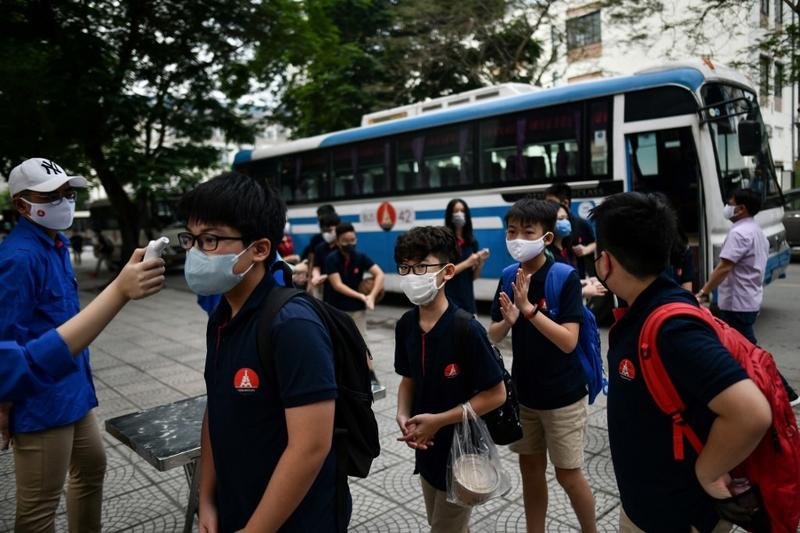Several countries to gradually relax measures within the next few weeks
 Students wearing face masks stand in a queue to get their temperatures checked at the Marie Curie school in Hanoi on May 4, 2020, as schools re-opened after a three-month closure to combat the spread of the COVID-19 novel coronavirus. (MANAN VATSYAYANA / AFP)
Students wearing face masks stand in a queue to get their temperatures checked at the Marie Curie school in Hanoi on May 4, 2020, as schools re-opened after a three-month closure to combat the spread of the COVID-19 novel coronavirus. (MANAN VATSYAYANA / AFP)
When Thailand began easing lockdown measures in the first week of May, university lecturer Eunice Barbara Novio immediately went to a nearby mall to shop.
The longtime resident of the northeastern Thai province of Nakhon Ratchasima has been teaching students online for the past month, after Thailand shuttered schools and public facilities to curb the spread of COVID-19.
Like most residents of Thailand, Novio did not leave home without her face mask and a bottle of hand sanitizer. Restaurants and other shops may have reopened, but she had to stand one meter away from the next customer. A store employee had to take her temperature before she could enter any establishment.
“We are still cautious,” Novio said, adding that since measures were eased, she “can feel that the city is slowly coming back to life. Malls and other businesses are expected to reopen before the month ends.”
Southeast Asian governments have been working to reduce the number of infections, imposing partial lockdowns since March. This policy was meant to stem the rise in COVID-19 cases, which have been straining public health systems.
However, this response to a public health emergency has come at a huge cost, including job losses, shuttered small businesses, increased poverty and sluggish economic growth.
Several countries will gradually be relaxing restrictions on movement and gatherings in the next few weeks, allowing most businesses and public transportation to resume operations. This comes with a caveat: People must maintain strict social distancing and personal hygiene practices.
Malaysia eased its partial shutdown on May 10 by allowing the reopening of some businesses and gatherings of up to 20 people for festive celebrations, but the conditional lockdown in general has been extended to June 9.
Thira Woratanarat, an associate professor in the Department of Preventive and Social Medicine at Thailand’s Chulalongkorn University, said there are several conditions to be met before any country can relax measures restricting movement.
“The government should consider easing the (lockdown) measures when the country has a very low number of infected cases,” Thira said, adding that businesses and people should also be ready to embrace the “new normal” after the lockdown has been lifted.
People should stay home as much as possible and always wear a mask when going outside, Thira said. They also need to keep their distance, avoid crowds and refrain from sharing personal items.
In addition, companies need to provide face masks and hand sanitizers to employees, regularly sanitize facilities and encourage employees to work from home, Thira said.
Sivananthi Thanenthiran, executive director of the Kuala Lumpur-based Asian-Pacific Resource & Research Centre for Women, said that while the lockdown is necessary for public health, it also was “devastating” for the poor.
“Women who were dependent on daily wages often lost the source of income and their families went hungry,” Thanenthiran said. She said nongovernmental organizations and charity groups have been helping poor families.
Sian Fenner, lead Asia economist for Oxford Economics in Singapore, said, “For many Asian economies, the pace of contraction in economic growth this year is likely to be deeper than the global financial crisis and, for some, the Asia financial crisis.”
She said the easing of lockdown measures will help governments to reignite their economies, but she believes they will remain cautious, especially because there is no vaccine for the COVID-19 virus yet.
“Given the risk of a second wave (of infections), I would expect governments to continue to monitor the situation and maintain a cautious approach to easing restrictions.”


